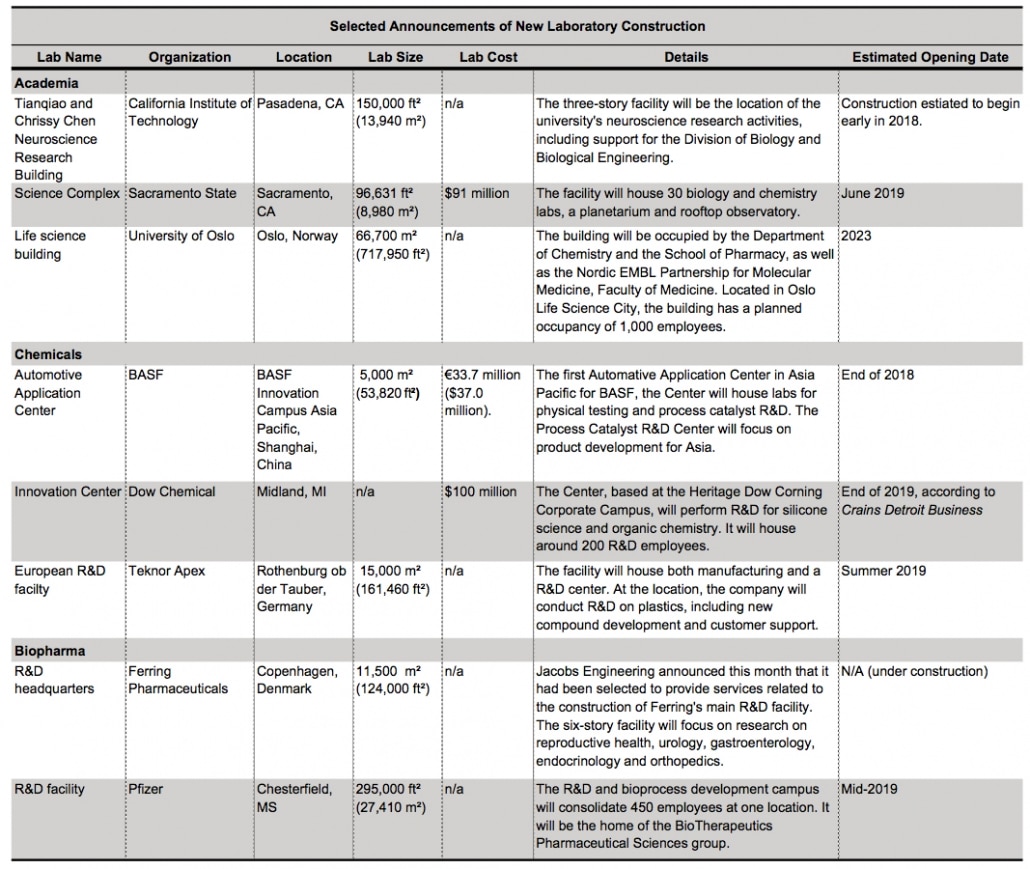Fall 2017 New Lab Review: EMBL and TUM Announce New Locations
In the second of IBO’s biannual selection of major lab announcements (see IBO 4/30/17), new labs in Germany and China are among the laboratories highlighted. The table below is a summary of new labs not yet opened.
Not only is Germany the location of new chemical R&D and government R&D facilities (see table above), the country is also adding to its plethora of academic research labs due to a new university location. In July, the city of Straubing was officially named as the fourth campus of the Technical University of Munich (TUM). A new building will house the 1,200 m2 (12,920 ft2) Integrative Research Center, which will conduct research on microbiology, organic chemistry, microreaction technology, and composites and process technology. Construction began in May on the $44.5 million (€40.5 million at €0.91 = $1) building that will house the lab.
Another German university, the Max Planck Institute for the Structure and Dynamics of Matter, will open a new building in Hamburg in the latter half of 2019. The 6,300 m2 (67,810 ft2), $41 million (€37 million) facility will house labs for physics, chemistry and biology research. “The building design will give us a chance to extend our research on the structural dynamics of material in the state of nonequilibrium because we will be able to establish two additional, worldwide renowned departments for experimental physics,” commented Angel Rubio, managing director of the Institute.
Another major scientific organization in Germany is also investing in an advanced research facility, with contributions from several instrument firms. In August, the Heidelberg branch of the European Molecular Biology Laboratory (EMBL) announced plans for its €45 million ($49 million), 5,960 m2 (64,150 ft2) Imaging Technology Center. It is expected to open in 2021, with the groundbreaking scheduled for next summer. The Center will be devoted to advanced microscopy, including correlative light and electron microscopy, and open to both EMBL and visiting scientists. Leica, Thermo Fisher Scientific and ZEISS Microscopy will together contribute $11 million (€10 million) to the Center.
Germany is also home to a new lab planned by chemical firm Teknor Apex (see table above). However, other German chemical firms are building new labs in China. In July, BYK Additives & Instruments, part of ALTANA, broke ground on a planned €30 million ($33 million), more than 50,000 m2 (538,200 ft2) integrated operation, including R&D, in Shanghai, China. “We will be equipping the labs with advanced chemical synthesis equipment and precision analytical instruments, and bolstering the local R&D team,” stated Gerd Judith, managing director of BYK Additives & Instruments. The facility is scheduled to open in the latter half of 2018.
Another chemical company choosing Shanghai for R&D investments is US-based Cabot. The company opened a 48,400 ft2 (4,500 m2) Asia Technology Center in September at its regional headquarters in the city. With 30 researchers, the facility will conduct R&D on rubber and specialty carbons, as well as fumed metal oxides and other materials. The location emphasizes customer collaboration and will house testing equipment. According to the press release, the lab “features advanced analytical and application testing equipment to provide global, best-in-class technical application service.”
Also in China, QC and compliance service firm AsiaInspect opened a 2,000 m2 (21,500 ft2) lab in Hangzhou in July. Housing multiple atomic spectroscopy and chromatography techniques, the lab conducts physical and chemical analysis for hardlines, softlines and food contact product safety.
Fellow testing services company SGS announced in July the opening of a 600 m2 (6,460 ft2) food testing lab in Moscow, Russia. The lab is expected to process 42,000 samples and 1.5 million tests per year, conducting microbiological, physical and chemical tests.
Also addressing the food industry, Netherlands chemical company Corbion is investing in its biobased food ingredients business with a new facility in Kansas City, Missouri. In June, the company broke ground on a 58,000 ft2 (5,490 m2) facility, part of the consolidation of certain North American locations, which will house a 15,000 ft2 (1,390 m2) R&D laboratory. The lab will focus on bakery and meat research. The estimated completion date is August 2018.
Another European food ingredient producer, Bühler, is also investing in research. The company has begun construction on a $51.4 million Innovation Campus in Uzwil, Switzerland, which will open in 2019, according to foodingredientsfirst.com. The Campus will include upgrades to R&D labs, such as the Bakery Innovation Center, and a new building with application labs.


